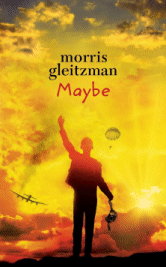
Maybe
Maybe
Morris Gleitzman
Viking, 2017
192pp., pbk., RRP $A19.99
9780670079377
Once I escaped from an orphanage to find Mum and Dad…
Then I had a plan for me and Zelda…
After the Nazis took my parents I was scared…
Soon I hoped the Nazis would be defeated and they were…
Now Zelda learns her grandfather’s story…
Maybe there will peace and happiness for Felix at last…
Felix, Gabriek and Anya, who is now seven months pregnant, are once again on the run trying to get back to Gabriek’s farm and hide from Zliv, the murderous brother of Gogol the Polish patriot who vowed ‘Poland has been crawling with vermin for centuries. Germans, Austrians, Jews, Ukrainians, Russians. Now we’re cleaning them up.” and killed by Felix.
But there is a very rude and dangerous homecoming and once again they have to flee – this time on a treacherous journey that lands Felix in Australia. Maybe this will be the land of opportunity for a young boy who only wants to attend university to become a doctor. But…
The sixth in this family of books that tells the remarkable story of Felix in a way that it has to have a considerable element of truth, shows that when the guns fall silent the war is not necessarily over and sanctuary is elusive not guaranteed, Yet throughout both this book and the series, Felix maintains his humanity and resourcefulness and in cases, his child’s logic provides a touch of humour to lighten the dark which Gleitzman does not shy away from. He believes our children need to know about this history which is so recent if could be that of their grandparents’ and refuses to patronise them by glossing over the not-so-nice.
Much has been written about the Holocaust that is inaccessible to our upper primary students because it is so factual and so foreign they can’t comprehend it – in this series written through the eyes of a child it becomes clearer and starts to develop a belief that this must never happen again, whether it be against a religion, a race, a gender or any other reason that people can be marginalised. Sadly, now termed “ethnic cleansing” it does continue but no longer does the world turn such blind, uncaring eyes.
For those who are venturing into the investigation of how Australian has developed in post-war times particularly with the immigration of so many from Europe, this series is essential reading to understand why people couldn’t just “return home”; why there were no homes to go to and why somewhere as faraway and foreign as Australia held such appeal. For it is the Felixes of this world who established not only the town I live in but this multicultural, tolerant nation that we and those who follow must work hard to maintain.
And now we await Always, the conclusion to an enriching and engrossing saga.
